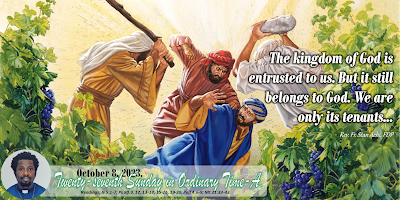WE ARE HIS PEOPLE.
October 8, 2023.
Twenty-seventh Sunday in Ordinary Time – A.
Readings: Is 5:1-7; Ps 80:9, 12, 13-14, 15-16, 19-20; Phil4:6-9; Mt 21:33-43.
“The stone that the builders rejected has become the
cornerstone; by the Lord has this been done, and it is wonderful in our eyes?”
Mt 21:42
A Tswana proverb says: “We are people because of other
people.” A Kikuyu proverb adds: “People are consumed by evil because of keeping
close to it, but not because of keeping away from it.”
We are God's people. We are his vineyard. We are the tenants
of his vineyard. These three main expressions in today's readings sound like a
challenge to each one of us and tell us of our obligations toward God and his
kingdom: His people, His Vineyard, and
the Tenants. There is a great implication of these expressions on our
relationship with God and our responsibility toward salvation and the coming of
his kingdom.
It is now the fourth consecutive week the Lord speaks to us
about the kingdom of God and our salvation. Through many images and allegories,
he leads us to know who is God, what is his kingdom, and how can we benefit
from it.
Salvation is the keyword of all the readings of this 27th
Sunday. We are also reminded of our stewardship mission. The seeds of God's
kindness are already in our midst. It is now up to us to let it produce and
give it back to God. God wants to save us all. For, we are his people, we are
his own possession, we are his vineyard.
It is beautiful to see how God makes the people his private
possession and how much care he puts into treating them. The first reading and
the Gospel use the allegory of the vineyard. The people of Israel are presented
as a vineyard loved by the Lord and for which he puts all his loving care.
Sadly, despite all the Lord did, "he spaded it, cleared it of stones, and
planted the choicest vines; within it he built a watchtower, and hewed out a
wine press..." the vineyard of God yield only sour grapes, not reaching
the expectations of its owner. As young people say, expectation vs reality. In
his deception, the Lord decided to destroy the vineyard for unfaithfulness.
This image tells a lot about the people of Israel and their
relationships with the Lord. The steps and efforts of the vineyard's owner fit
well what the Lord did for the people. While they were slaves in Egypt, he took
them, brought them out from slavery, and led them through the care of Moses,
Aaron, and later on Joshua, to the land of Cana, a land he promised them, a
land of fertility. But once in the land, the people rejected him and did not
keep faithfulness to his law. In his deception, he will let them face the Babylonian
exile.
The Lord Jesus takes up the same image of the vineyard, but
now with a little difference, an intrigue. This time it is about the kingdom of
God entrusted to men to be built. The owner, God, did again all the
preparations and needed work. He just entrusted the care and the productivity
to stewards. But those stewards or tenants showed to be unfaithful. In
conclusion, the Lord decided to take his vineyard away from their tenancy.
This is a strong warning to you and me. The kingdom of God
is entrusted to us. But it still belongs to God. We are only its tenants. We
are expected to make it bear fruit and give it to God. If we fail to do our
part, or if we show being unfaithful, it will be taken away from us. We should
not let the care for the things of this world deter our relationship with God.
St. Paul, in the second reading, points out the way for us to stay in God's
embrace and inherit his kingdom: "Have no anxiety at all, but in
everything, by prayer and petition, with thanksgiving, make your requests known
to God." And the Apostle of the Gentiles adds: "Whatever is true,
whatever is honorable, whatever is just, whatever is pure, whatever is lovely,
whatever is gracious, if there is any excellence and if there is anything
worthy of praise, think about these things." We should aim for a virtuous
life and make God's will our priority. Only in so doing will we live in peace
and harmony.
Article 781 of the Catechism could serve as a conclusion of
our meditation: "At all times and in every race, anyone who fears God and
does what is right has been acceptable to him. He has, however, willed to make
men holy and save them, not as individuals without any bond or link between
them, but rather to make them into a people who might acknowledge him and serve
him in holiness. He therefore chose the Israelite race to be his own people and
established a covenant with it. He gradually instructed this people... All
these things, however, happened as a preparation for and figure of that new and
perfect covenant which was to be ratified in Christ... the New Covenant in his
blood; he called together a race made up of Jews and Gentiles which would be
one, not according to the flesh, but in the Spirit."





Comments
Post a Comment